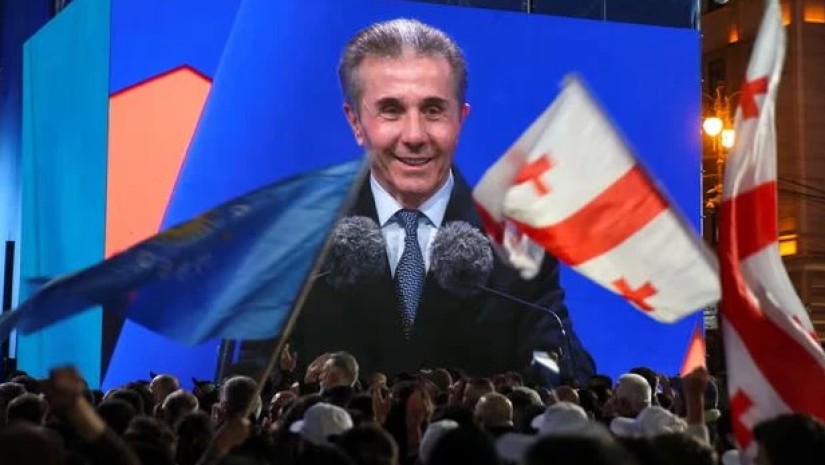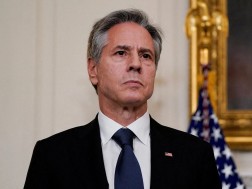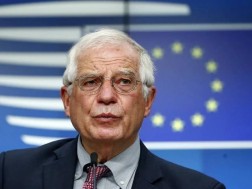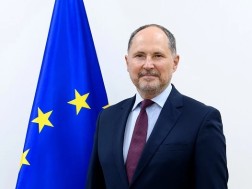Georgians are heading to polls in a critical election that could determine whether one of the once most pro-western former Soviet states will veer towards a more authoritarian, Russia-aligned path.
For the past three decades, Georgia – a country of 3.6 million people nestled in the Caucasus mountains – has maintained strong pro-western aspirations, with polls showing up to 80% of its residents favour joining the EU.
In recent years however, the government, led by the populist Georgian Dream (GD) party, has increasingly shifted away from the west in favour of Russia, showing reluctance to condemn Moscow for its invasion of Ukraine.
The parliamentary elections are seen by many as the most important since independence from the Soviet Union in 1991, said Kornely Kakachia, the director of the Georgian Institute of Politics. “This is a watershed moment that will determine whether the country becomes a sovereign democracy integrated with the west or falls back into Russia’s sphere of influence,” he said in an interview in the capital, Tbilisi.
Longtime observers stress that these elections should be seen through a broader lens than just a geopolitical tussle between Russia and the west, with the country’s democratic future hanging in the balance.
Thomas de Waal, a senior fellow with Carnegie Europe and an expert on the region, said: “What is at stake here is Georgian democracy. There is a real risk that the country becomes a one-party state. The Georgian Dream party has been pretty open about the direction it wants to go.”
GD, which has been in power since 2012, was founded by the shadowy billionaire Bidzina Ivanishvili, who made his fortune in Russia in the 1990s and is viewed by many friends and foes alike as Georgia’s most powerful figure even though he has not held public office for more than a decade.
In recent weeks, Ivanishvili and his allies have vowed to ban all major opposition parties and remove opposition lawmakers after the elections, labelling them as “criminals” and “traitors”.
During a rare public rally on Wednesday in central Tbilisi, Ivanishvili doubled down on the pledge, having promised earlier to hold a “Nuremberg trial” of members of UNM, the main opposition party. UNM was founded by Georgia’s former president Mikheil Saakashvili, who is currently in prison on charges of abuse of power that his allies say are politically motivated.
GD’s central campaign message has been “Choose peace, not war”, implying that the opposition would pull Georgia into a Ukraine-style conflict, while only their leadership can ensure peace and stability. Splashy billboards for the party have sprung up across the capital featuring images of bombed-out Ukrainian churches and sports arenas, contrasting them with peaceful images from Georgia.
Russia, which invaded Georgia in 2008 and backed armed separatists in the Moscow-backed breakaway regions of Abkhazia and South Ossetia, remains unpopular among ordinary Georgians.
The Russian invasion of Ukraine has invigorated the pro-western opposition, which criticises the government for its neutral stance towards Moscow and its reluctance to impose sanctions, viewing it as a sign of allegiance to the Kremlin. But some remain wary of the possible consequences of provoking Russia.
GD’s message finds the most support in regions that suffered heavily during the 2008 Russian invasion – a five-day conflict that some Georgians blame on the reckless policies of Saakashvili, who was president at the time. The war left deep scars in the country, with Russian troops stopping just 25 miles from Tbilisi.
Maka Khutsishvili, a shop owner in Tbilisi who is originally from the city of Gori, where he was present during a brief occupation by Russian troops in 2008, said: “I am not against Europe, but we border Russia, not France or Germany. No one will come to support us if Russia invades. Young people protesting against the government might not remember the war but we do … Right now we need peace and the current leaders can guarantee it.”
GD also draws support in conservative regions of the country, far away from the hipster cafes and boutique shops that have made Tbilisi a popular tourist hotspot. In the industrial heartlands, where a centrally planned economy once provided jobs and a degree of welfare, unemployment and mass migration have driven nostalgia for the relative prosperity of the old Soviet era.
In these areas the Georgian government, aligned with the deeply conservative and influential Orthodox church, has sought to galvanise anti-liberal sentiments by campaigning on so-called “family values” and criticising what it portrays as western excesses.
In the summer, the parliament passed legislation imposing sweeping restrictions on LGBTQ+ rights, a move critics say mirrors laws enacted in neighbouring Russia, where authorities have implemented a series of repressive measures against sexual minorities.
In a recent interview rife with transphobic and homophobic sentiments, Ivanishvili depicted Georgia as embroiled in a cultural struggle against the west, which he accused of trying to export corrosive values.
Among other claims, he asserted that in the west, parents put pressure on children to undergo gender affirmation surgeries, and that “men’s milk” was regarded as “the same as women’s”. Ivanishvili’s critics have urged that his inflammatory rhetoric be taken seriously, emphasising the geopolitical stakes involved.
Georgia, located between the authoritarian regimes of Iran, Russia and Turkey, provides the only alternative route – besides Russia – for central Asian and Azerbaijani trade with the west. The route has become increasingly important as the west seeks to reduce its dependence on Russian energy and turn to the region’s oil and gas resources.
“We are at a unique moment when the government is transforming the geopolitical orientation and DNA of the nation,” said Tina Khidasheli, the chair of the NGO Civic Idea and a former defence minister. “Georgia’s pro-western course was always an exception in the region. Of course this will be a victory for Russia, but also for all the other authoritarian states that border us.”
Recognising the urgency of the situation, Georgia’s notoriously divided opposition has attempted to unite by forming four pro-European blocs and have vowed to cooperate. Saakashvili’s UNM party, the largest of the blocks, has said it is willing to commit to the pro-western president Salome Zourabichvili’s initiative to form an interim technocratic government in case of a GD loss.
But UNM, which has a solid base of loyal voters, remains a divisive proposition, with many in the country still angered by Saakashvili’s second term, which was marred by widespread human rights abuses and arbitrary detentions.
Zourabichvili, whose role is largely ceremony, ruled out at a press conference on Thursday any scenario other than a victory for pro-European forces. But even seasoned watchers find it difficult to predict Saturday’s outcome, as polls – each commissioned by different political factions – show wildly different results.
GD is likely to win the most votes, but unless it secures a constitutional majority it may struggle to form a government, with all other blocks refusing to collaborate with it.
Few expect a free and fair contest in a country where ruling parties have historically relied on their so-called “administrative resources” – an umbrella term that includes pressing state employees to vote and offering cash handouts to mostly rural voters.
Opposition and civil society leaders are concerned that if polls show GD and the opposition parties neck and neck, the ruling party may attempt to manipulate the results, which could trigger mass protests, potentially followed by a harsh police crackdown.
Another looming question is whether Ivanishvili would voluntarily relinquish power if he were to be defeated. Kakachia believes that for the oligarch, staying in power will feel like a matter of personal survival. “Georgia has a long history of political vendettas,” he said. “Whoever comes to power tends to target their predecessor, and Ivanishvili knows this all too well.”
In the spring of this year, tens of thousands of people took to the streets of Tbilisi to protest against the adoption of a “foreign agents” bill that required media and NGOs receiving more than 20% of their funding from abroad to register as “agents of foreign influence”.
The bill, which for now has derailed Georgia’s EU aspirations, has been labelled a “Russian law” by critics, who liken it to legislation introduced by the Kremlin a decade earlier to silence political dissent in the media and elsewhere.
Zuka Berdzenishvili, a co-founder of the Georgian pro-democracy movement Shame who helped organise the spring protests, said: “I am worried that protests are almost inevitable. I don’t think the current government is willing to step down democratically.”
In the summer, Berdzenishvili was ambushed and beaten, part of a string of similar attacks against the opposition by unidentified gangs, which are widely believed to be linked to the government.
“I hope the Georgian people will have the stamina to push through and fight,” Berdzenishvili said. “We don’t have another choice.”
Source: The Guardian























